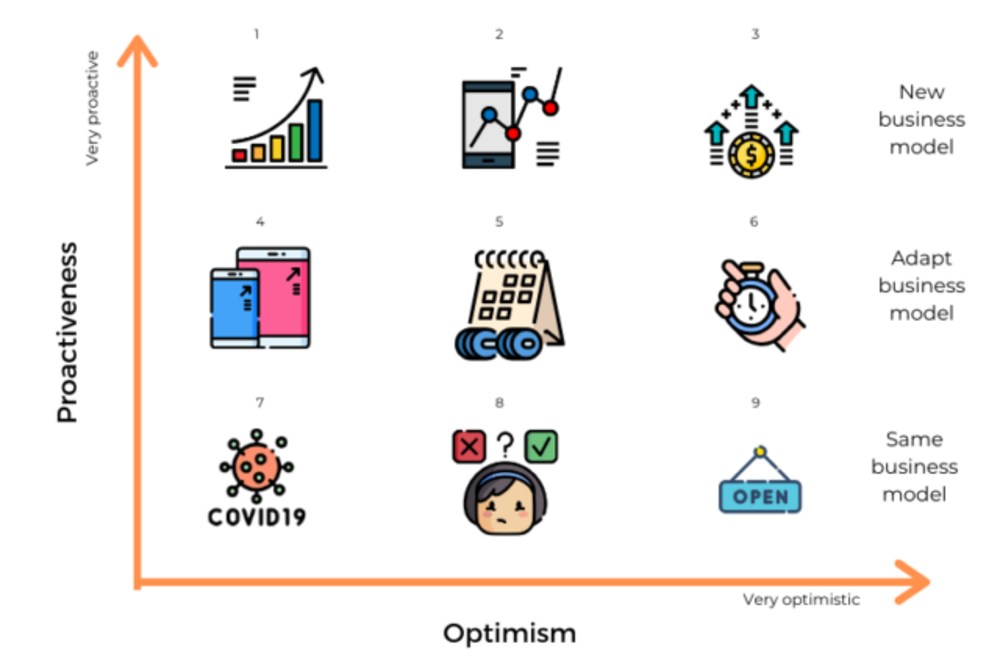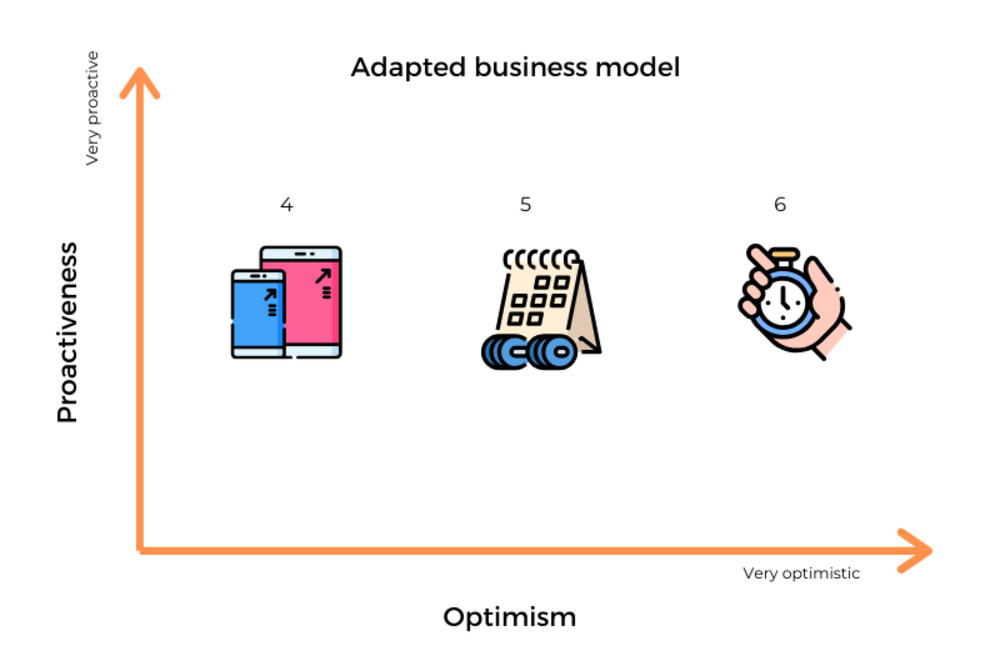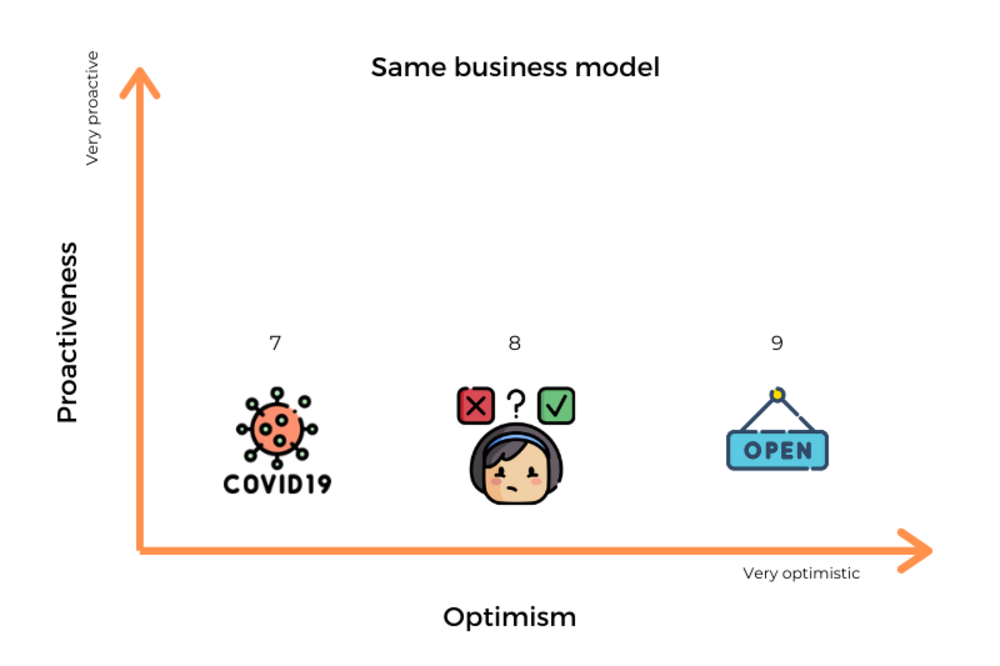It’s safe to say that the fitness industry will not be the same in the post-coronavirus lockdown world. We’re going to see the equivalent of the transition when we went from Blockbuster to Netflix. People value convenience and convenience is key in the after pandemic fitness industry .
They value loyalty and specificity and therefore it doesn’t look like online coaching or online engagement is going to go away anytime soon. Switching to digital, acquiring a new skill set, adapting to the new business model are essential steps to plan a successful strategy to face the new normal after COVID-19.
When you switch most of your clients to a new post-coronavirus offering (either an exclusively remote or a hybrid one), you have to be aware that what people still value the most is that one-on-one attention they were enjoying in your facility. With members craving more of a 24/7 engagement model, it’s the perfect time to rethink your business plan and decide where you want to be once this is over.
Lead your business through the coronavirus crisis
When non-essential businesses were forced to shut down, we all started sharing doubts and worries on how to survive the pandemic and make your business grow despite the current situation. No one was really ready for what happened, and one could only foresee it based on what was happening in China and Italy, which were the countries that were hit first.
Most businesses in the industry were used to an old-school face-to-face business that counted on human interaction in physical locations. For that a mindset shift was needed.
In order to make sure you are ready to face the new situation, you need to understand where your business is at. How proactive and optimist do you feel?
Focus on this new approach to survive 2020
We created a XY graph to show what that new approach looks like. On the x line we have “Optimism”. What we mean by this is; how afraid are you of coronavirus?
How long do you think it is going to go on for? It answers these kinds of questions: do you think it’s going to finish next week? Or do you think it might go on next year? And how resilient is your business and business model during this time?

On the y line we have “proactiveness”. This axis highlights how entrepreneurial you are during this time. Do you see yourself moving into the online space or other business models? Are you absorbing competition? Are you not thinking about the consequences of COVID-19 at all?
Based on the two definitions, we put this on a spectrum. So on the y-axis going up and down you have to probe the proactiveness. So if you’re not very proactive that’s on the bottom, but if you’re super proactive and doing a lot, that’s up on top.
And then on the bottom you have optimism. Do you think that this is going to be short-term and not really have an impact? That’ll be closer to the right. And then are you fearful of this? Do you think that this is going to be something that is impacting your business? That says that you’re less optimistic, and that’s on the left.
Adopting a new business model
The pandemic has definitely challenged the whole industry up to a point where those who were already using an online solution really made the best out of it and digitized their entire business.
Some of those who were not yet ready to go digital realised that a switch in mindset was needed in order to make the most of this opportunity, to reinvent the business and reposition as an online service. It’s not just about adapting to the situation, it’s going all-in with a new business model.
- 1. You can position on the very high side of proactiveness if you’re super proactive but fearful. You need to start taking actions to implement new business models in order to be able to compete in this new potentially long lasting world.
- 2. Over to the right, you feel fine regardless of the circumstances. You feel like it could be a good opportunity to expand your business and experiment a bit more.
- 3. You are on the far right if you feel like it doesn’t really matter if this blows over or not. You think your business is still going to make money in the situation regardless of wherever we are. Despite any potential fear of what the post-pandemic world is going to be like, you are still 100% optimistic.

Adapting the business model to the situation
Resilience and adaptability are great skills to survive crises like the latest COVID-19 recession. It’s up to you whether you feel the urge of changing your business model as soon as possible, or take your time to research more before moving forward with a change.
- 4. On the far left side is when you know you need to adapt more and you are making an effort to renew your business plan. Despite that, you’re not sure how to under the current circumstances.
- 5. Over to the right is where you have a little bit more optimism about the situation. At this point you feel like you have done and adapted enough. You assume that you can just relax and hold on to the changes you made until the crisis blows over.
- 6. On the farthest right you feel like you have adapted to the bare minimum and really have no sense of urgency. You are optimistic this is going to blow over pretty soon and everything is going to go back to normal.

Same business model no matter what
You are at this point if you haven’t found the motivation or the means to react to the situation. If you think your mindset matches any of the following moods, then you might be stuck with your business and probably won’t be able to survive the current recession.
- 7. If you are not very proactive then you’re at this bottom rung here. You are also very negative about the situation and your business. Here is where you’re looking at this as doomsday, and you basically think you are out of the game and you have no chance to overcome the crisis.
- 8. Moving over a little bit to the right then, this is where you have a little bit more optimism. Maybe you don’t know how to adapt, and you are not sure if it’s worth the effort in order to adapt during this time.
- 9. On the far right you’re more optimistic about how long corona may last. Maybe you’ve looked at it and said “no big deal, we’ll shut the doors for a couple weeks and we’ll reopen later when everything is blown over”. This is not the best approach since this situation has changed the entire industry and it is best to acknowledge it.





